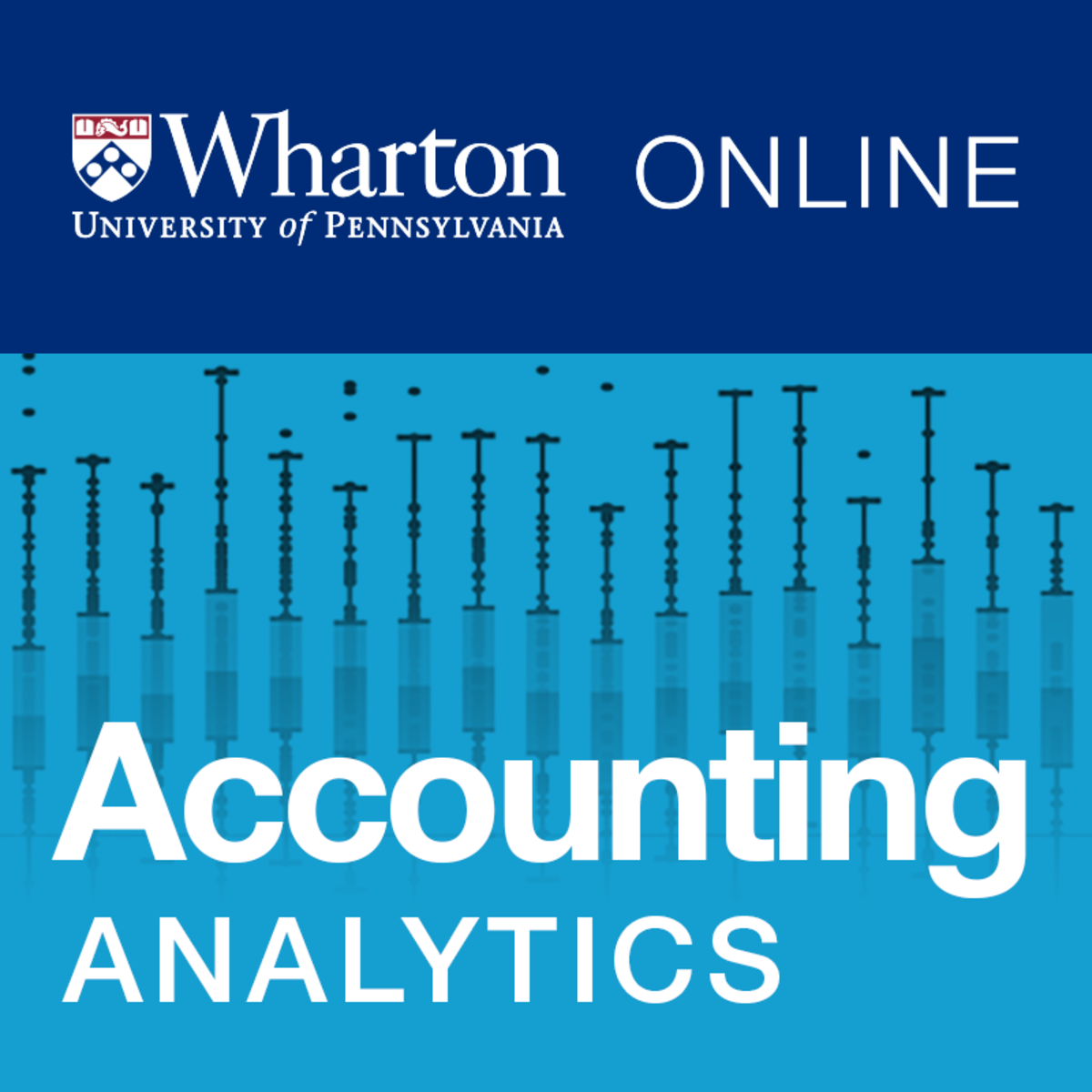Back to Courses









Finance Courses
Showing results 1-10 of 270

FinTech Disruptive Innovation: Implications for Society
This course “FinTech Disruptive Innovation: Implications for Society” help you understand how disruptive innovations create opportunity in finance industry and its impact to society especially your career. You would be able to examine and analyse how FinTech innovations would affect companies that relates to FinTech services and how it might affect your career in finance.
You will learn about how peer to peer lending disrupt finance industry in different countries, the diversity of impact by FinTech in the comparison of East vs West, Big firms vs Small firms, and different generations etc., how to predict FinTech trends in different markets, and finally what you should do to pursue your career and secure your position in FinTech industry.

Accounting Analytics
Accounting Analytics explores how financial statement data and non-financial metrics can be linked to financial performance. In this course, taught by Wharton’s acclaimed accounting professors, you’ll learn how data is used to assess what drives financial performance and to forecast future financial scenarios. While many accounting and financial organizations deliver data, accounting analytics deploys that data to deliver insight, and this course will explore the many areas in which accounting data provides insight into other business areas including consumer behavior predictions, corporate strategy, risk management, optimization, and more. By the end of this course, you’ll understand how financial data and non-financial data interact to forecast events, optimize operations, and determine strategy. This course has been designed to help you make better business decisions about the emerging roles of accounting analytics, so that you can apply what you’ve learned to make your own business decisions and create strategy using financial data.

FinTech Foundations and Overview
Our primary goal is to help you to understand FinTech and to become more confident and persuasive in your ability to analyze and make recommendations to executives within the finance industry regarding how to react to these changes.
This FIRST MOOC ON FINTECH IN ASIA-PACIFIC offered by HKUST presents the insight of several professors from the top business school in Asia as well as perspectives from industry professionals. HKUST has been ranked for many years as the No.1 EMBA program in the world, as the number one Finance program in Asia, and as the top MBA program in Asia by multiple independent rating and review journals and surveys.
This course "FinTech Foundations and Overview" offers the combined strengths of HKUST in Business, Finance, and Technology as one the world's leading academic institutions on an important area of technology and business innovations. For learners from outside Asia, this also gives an insight into changes happening in the most advanced FinTech markets of the world, since Asia leads worldwide in FinTech adoption and creative innovations.

Introduction to Personal Finance
This course is a general overview of a variety of personal finance topics - including budgeting, the importance of your credit score, cash flow, setting financial goals, and taxes. Taught by two CERTIFIED FINANCIAL PLANNER™ Professionals, the concepts are broken down through videos, readings, and activities so you can apply what you are learning in real time. The course provides the foundation to build on for the rest of The Fundamentals of Personal Finance Specialization or as a standalone survey course to improve your understanding of basic personal finance terminology, as well as how they apply to your own financial situation.
Whether you are just starting college, nearing retirement, or somewhere in between, this course will provide you with the knowledge to understand your money and actionable steps to manage your finances in the future. This course is geared towards learners in the United States of America.

Financial Accounting Fundamentals
This course, developed at the Darden School of Business at the University of Virginia and taught by top-ranked faculty, will teach you the tools you'll need to understand the fundamentals of financial accounting. Concise videos, the financial records of a small business, and "your turn" activities guide you through the three most commonly used financial statements: the Balance Sheet, the Income Statement, and the Statement of Cash Flows. Beyond recording transactions, you'll learn how to prepare these financial statements, and read and analyze them to draw basic conclusions about a company's financial health.
By the end of this course, you will be able to:
- Use journal entries to record transactions
- Prepare and use t-accounts to summarize transactions recorded during an accounting period
- Describe the three most commonly used financial statements and how they fit together
- Prepare these financial statements based on transactions recorded during an accounting period
- Draw basic conclusions about a company's financial health

Python for Finance: Beta and Capital Asset Pricing Model
In this project, we will use Python to perform stocks analysis such as calculating stock beta and expected returns using the Capital Asset Pricing Model (CAPM). CAPM is one of the most important models in Finance and it describes the relationship between the expected return and risk of securities. We will analyze the performance of several companies such as Facebook, Netflix, Twitter and AT&T over the past 7 years. This project is crucial for investors who want to properly manage their portfolios, calculate expected returns, risks, visualize datasets, find useful patterns, and gain valuable insights. This project could be practically used for analyzing company stocks, indices or currencies and performance of portfolio.
Note: This course works best for learners who are based in the North America region. We’re currently working on providing the same experience in other regions.

Financial Markets
An overview of the ideas, methods, and institutions that permit human society to manage risks and foster enterprise. Emphasis on financially-savvy leadership skills. Description of practices today and analysis of prospects for the future. Introduction to risk management and behavioral finance principles to understand the real-world functioning of securities, insurance, and banking industries. The ultimate goal of this course is using such industries effectively and towards a better society.

Central Banks and Monetary Policy
The purpose of this course is to provide you with an understanding of central bank policies and how such policies affect financial markets and the economy. The main aim of this course is to provide you with insights about the macroeconomic relationships between interest rates, inflation, and unemployment that allow you to assess central bank actions and appreciate how this action will affect the economy. The ability to extract relevant information from financial market and economic data about the macroeconomic environment and central bank actions is an important skill that will be useful for your decision-marking in your professional career and your personal financial choices.

Investment Management in an Evolving and Volatile World by HEC Paris and AXA Investment Managers
Have you ever wanted to invest in financial markets, but were always afraid that you didn’t have the proper tools or knowledge to make informed decisions? Have you ever wondered how investment management companies operate and what fund managers do? AXA Investment Managers, in partnership with HEC Paris, will introduce you to the most important ideas and concepts in investment management, to help you better understand your financial future.
This course will enable you to:
• Define what type of investor you are, your investment objectives, and potential constraints.
• Identify the main investable assets and important players in financial markets.
• Understand basic portfolio management techniques.
• Apply these techniques in real case studies from the outset, through practical assessments.
Finally, we will provide a comprehensive overview of today's asset management industry: the product cycles, professionals, and regulations. For those who want to identify a talented fund manager to invest for you, we offer important criteria for selecting one. For those who are interested in learning more about this fascinating industry, we lay the foundation for your ongoing financial journey. Join us now to explore the world of investment management!
Course Specialists
The course has been developed in collaboration between HEC Paris, with Hugues Langlois managing the academic aspect, and AXA Investment Managers specialists, sharing their experiences and expertise and coordinated by Marion Le Morhedec. AXA Investment Managers participants include Maxime Alimi, Stephanie Condra, Nicholas Jeans, Elodie Laugel, Pierre-François de Mont-Serrat, Jean-Gabriel Pierre (AXA Group), Dorothée Sauloup, Irina Topa-Serry, Fiona Southall, Patrice Viot Coster, Susanna Warner, and Joachim Weitgasser.
Recommended Background
We expect most participants to have a basic level of knowledge in mathematics and economics. However this is not essential, and we believe that people from any background can succeed with commitment and a strong interest.
Be aware that in the case study, you will have to use Excel.
Course Format
This course will run for 4 weeks and consists of 4 modules, each with a series of lecture videos between 5 to 8 minutes long. Each module contains a set of practice and graded quiz questions. A complete portfolio management exercise covers concepts learned in all modules
Language
The course is in English, with Spanish, Italian, German, French, and Chinese (Simplified) subtitles.
The Project
The preparation of this MOOC has been an exciting adventure for many professionals at AXA Investment Managers and HEC, both for the speakers and a wealth of contributors. Thank you to all of them.
We hope you enjoy this course as much as we enjoyed creating it!

Alternative Approaches to Valuation and Investment
In this course, participants will develop an understanding of the intuitive foundations of asset and investment valuation, and how alternative valuation techniques may be used in practice. This is part of a Specialization in corporate finance created in partnership between the University of Melbourne and Bank of New York Mellon (BNY Mellon).
View the MOOC promotional video here: http://tinyurl.com/h75pzt6
Popular Internships and Jobs by Categories
Find Jobs & Internships
Browse
© 2024 BoostGrad | All rights reserved